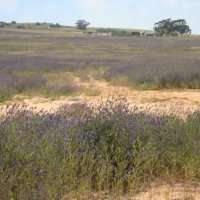Big data helps researchers in battle to control plant invaders

Researchers at The University of Western Australia are part of an international team that has discovered why some plant species are more successful than others at successfully invading new regions.
In a research paper published today in Proceedings of the National Academy of Sciences (PNAS), co-author Professor Laco Mucina, from UWA's School of Biological Sciences, said the findings were of economic and environmental significance because invasive species caused extensive damage around the world.
Such invasive species include Echium plantagineum commonly known as Paterson's Curse. Native to the Mediterranean Basin, it is invading old fields in the southern hemisphere, hampering vegetation recovery on abandoned agricultural land.
"Which species become successful aliens outside their native range is a fundamental question in ecology because it informs efforts to mitigate ecological and economic losses caused by biological invasion," Professor Mucina said.
"For alien plants of European origin, the long association with human-influenced environments is considered a key factor for their success as established aliens following their introduction to other regions.
"By combining a comprehensive list of European habitats (known as the EuroVeg checklist) and their species composition with a database of naturalisation records of plants worldwide, we show that it is the balance between the level of disturbance and naturalness of the habitat in native ranges that determines the probability that species naturalise in other parts of the world."
Professor Mucina said in order to understand and control invaders, it was important to understand their ancestral ecology: the conditions needed for them to thrive and reproduce in their native homeland.
"It appears that this ecological priming is an important pre-requisite to become invader in new conquered regions," he said. "This notion seems trivial, but up until now there was hardly any data available that could prove this.
"Linking huge databases made this possible. One of the databases was complete vegetation system for the continent of Europe and was provided one of the basic conditions to performing such a test. This information system was unique because it featured a complete picture of the vegetation variability of one continent for the first time."
The research paper was a prime example of how big data and a team of international experts could answer questions that were impossible to test in the past, Professor Mucina said.
More information: Veronika Kalusová et al. Naturalization of European plants on other continents: The role of donor habitats, Proceedings of the National Academy of Sciences (2017). DOI: 10.1073/pnas.1705487114
Journal information: Proceedings of the National Academy of Sciences
Provided by University of Western Australia


















